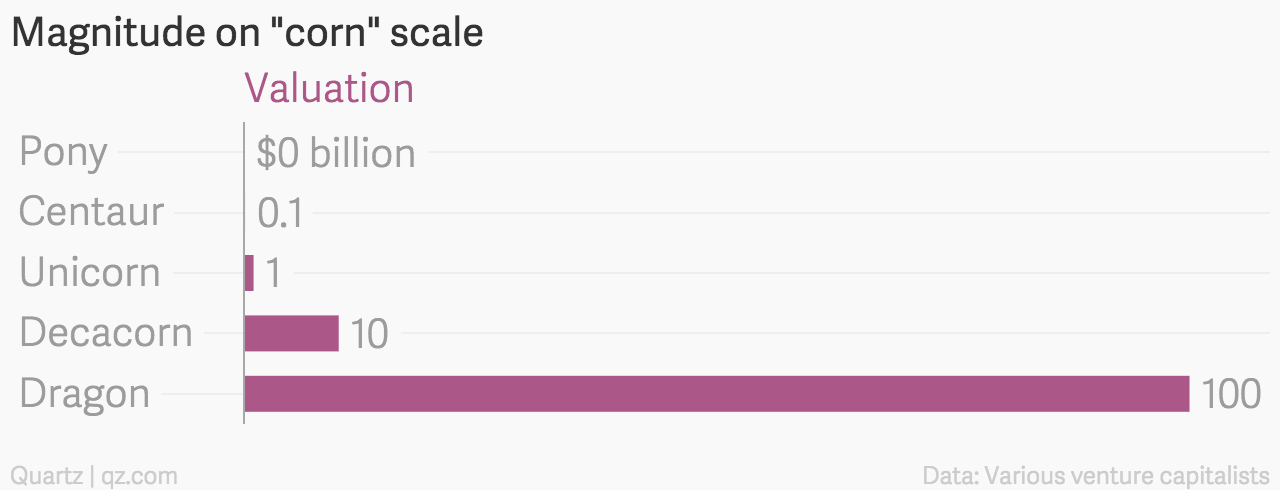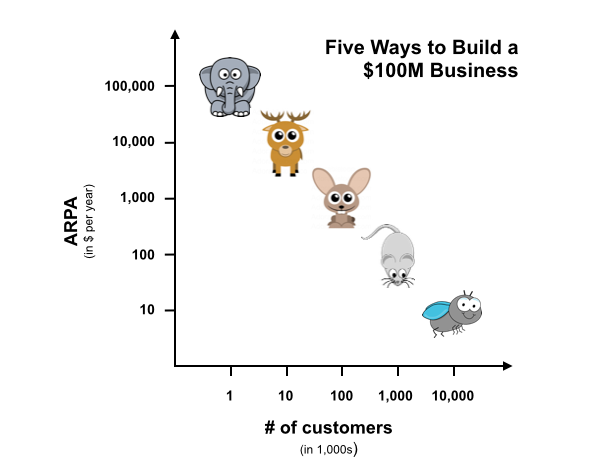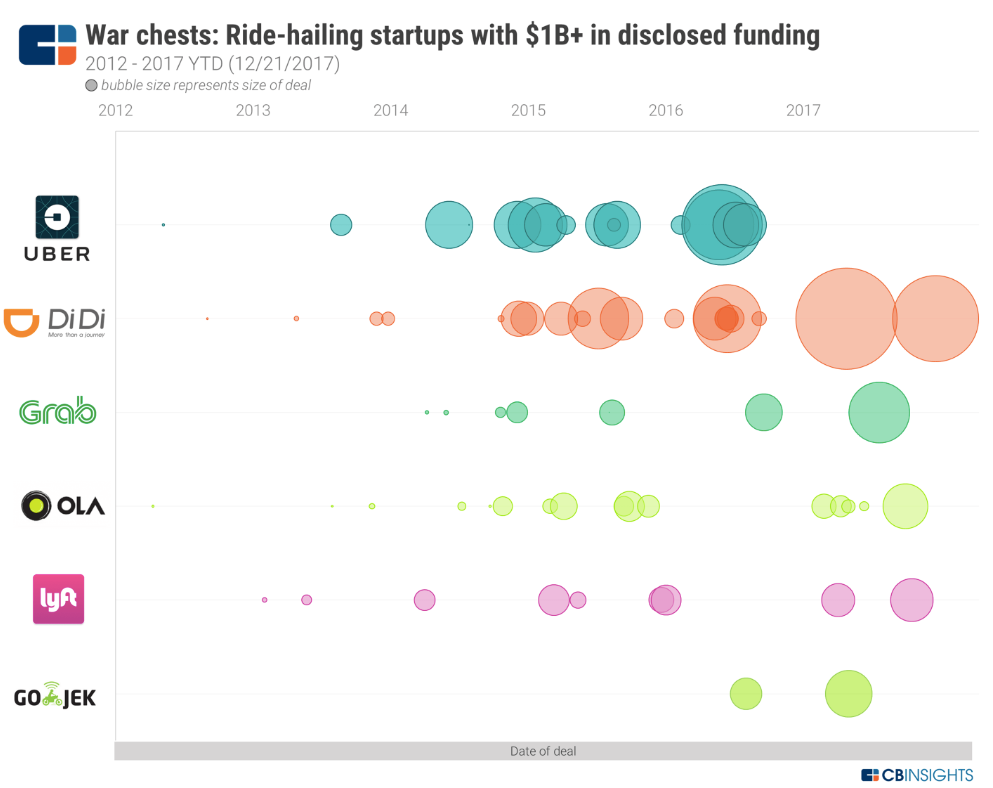By now, we all know what a startup Unicorn is, thanks to the digital revolution of the last decade and the mainstream explosion of tech startups. The startup sub-culture has actually given birth to a lot of other startup animals out there. There are some more recognizable ones based on valuation, some known mostly by tech salespeople who use them to categorize customer types, and some obscure ones only familiar to industry insiders. You’ll find all of them below along with a new one that is quickly gaining fame in the fast-growing startup ecosystems of Southeast Asia: Black Cats.
Quartz did a fantastic job of summarizing the valuation-based mythical creatures. Starting with Unicorns valued at $1B, which were quite rare half a decade ago, the taxonomy scaled upwards into Decacorns and Dragons, with valuations of $10B and $100B respectively. It also scaled down to Centaurs that breached the $100M threshold and Ponies that were sub $100M.

Image credit: Quartz
To help founders think about the many ways of growing their startups, Christopher Janz of Point Nine Capital expanded the startup animal taxonomy by writing about the five ways to build a $100M business. On opposing ends of the spectrum are the elephants, which are enterprise customers paying $100k+ per year, and flies, which are active consumers paying $10+ per year. In between, you’ll find the deer paying $10k+ annually, the rabbits paying $1k+ and the mice paying $100+.

Image credit: Christopher Janz, Point Nine Capital
But it doesn’t stop there. Some other startup animals:
1. Narwhals– this is what the Canadian tech ecosystem calls its Unicorns, alluding to the fact that these toothed whales actually exist.
2. Cockroaches– are startups that aim for profitability from Day 1 and are therefore less susceptible to economic bubbles (but unfortunately not nuclear explosions like the real animals are).
Before introducing a new kind of startup prevalent in Southeast Asia, it is helpful to go through two more “animals” that do not necessarily refer to startups:
1. Black Swans– are highly unlikely events with large magnitude. The term was popularized by Nassim Taleb in his book of the same name. The metaphor alludes to the ancient belief that black swans do not exist and was later re-interpreted after the discovery of black swans in the wild. In Taleb’s book, he makes reference to positive and negative black swans.
2. Copycats– are individuals who copy or mimic other people. In business parlance, the term refers to entrepreneurs who completely replicate successful business models. This may be done either in the same market by an eventual competitor or in another geography that provides a very similar set of circumstances allowing for the model to work without revision.
Cats are everywhere while Black Swans are very hard to find. Black Cats are somewhere in the middle. If imagination permits, think of Black Cat Startups as a hybrid between the attributes of Black Swan events and Copycat businesses. On the surface, these startups may look and operate like Copy Cats with run-of-the-mill marketplaces or Uber for X models. You’ll find many of these all over the region. For example, there are now furniture marketplaces in most countries in Southeast Asia, including Hipvan in Singapore, Mitssy in Vietnam and Fabelio in Indonesia. Can any of them convincingly win their home markets, break out, and consolidate the region? Time will tell if they can operate as Black Cats locally and also regionally.

Image credit: German Accelerator Southeast Asia
It is already apparent that the hybrids taking proven models in developed markets and localizing it to the cultural nuances of their chosen country initially and the rest of the region eventually will turn out to be the big winners. Of course, the easiest example is Grab which fended off Uber despite a 10x disparity in funds raised as of 2016 when the global giant pivoted to Southeast Asia after it lost out to Didi Chuxing in China. In 2018, Uber finally caved in and sold their regional business to Grab, which just understood the market better. In a region where smartphones were still a luxury a few years ago and 90% of transactions still take place in cash, they were teaching drivers in many markets how to use smartphones and accepting cash almost 2 years before Uber did in some cities.
Even within the region, some Black Cats are winning against other Black Cats by digging deeper and catering to local nuances versus just regional ones. Go-Jek, the $4B behemoth in Indonesia, grew rapidly and under-the-radar of government scrutiny because it understood that it is a 2-wheeler market rather than a 4-wheeler market.

Image credit: CB Insights
There are many more examples. Despite an arguably inferior UI/UX, Qoo10 is dominating the Singaporean e-commerce market by optimizing the experience for SME merchants thereby ensuring steady local supply and the lowest prices. Malaysian startup IFlix, which has raised over $300M, is giving Netflix a run for its money by allowing users to download content for later viewing in a region with some of the slowest internet speeds globally.
If you want to become a Black Cat startup in Southeast Asia, there is always the old fashioned grit-and-grind startup way of just navigating the dark jungle on your own. Obviously, there are also faster and easier ways to break through the tangled vegetation.
For local founders, broaden your fundraising horizon. Local investors are usually easier to speak with but inviting cross border funds to join your funding rounds may give you access to more data points across multiple markets. For expat founders, try joining startup landing pad programs that help you sift through regulatory and cultural considerations as well as product-market fit, go-to-market strategy and fundraising.
In popular culture, Black Cats are most commonly associated with bad luck and many modern day societies still have the superstition that you should not let one cross in front of you. But in Southeast Asia, you should look for the Black Cats. Or try to be one.


